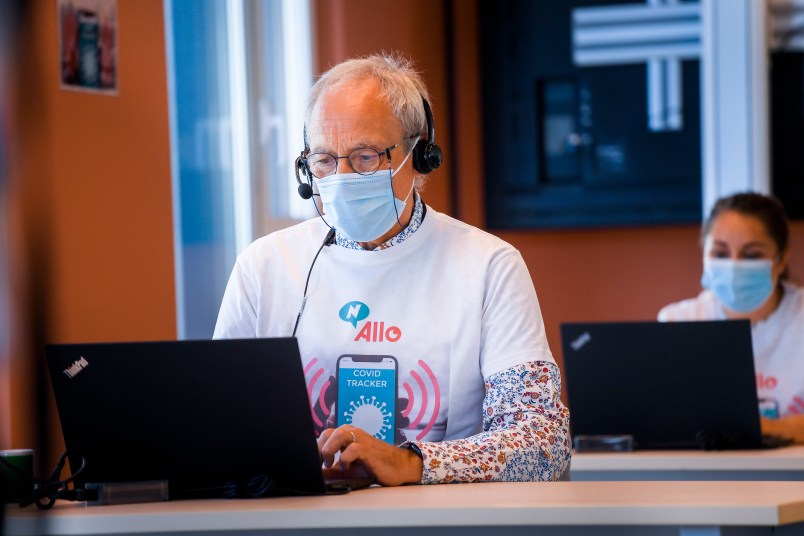This article is part of TPM Cafe, TPM’s home for opinion and news analysis.
As the world learns more about the novel coronavirus, the value of rigorous contact tracing — the process of persuading potentially exposed people to quarantine — is becoming clearer. It’s one reason the U.S., a country of nearly 330 million, has suffered 150,000 deaths and counting, while only one of Vietnam’s 95 million people have died from COVID-19. The Southeast Asian country was quick to implement contact tracing, as well as mass testing, lockdowns and compulsory wearing of masks.
Here, contact tracing has been slow and uneven. In fact, many states haven’t made public how fast or well they’re implementing the process, if at all. “I don’t think we’re doing very well,” answered Dr. Anthony Fauci, director of the National Institute of Allergy and Infectious Diseases, when asked in June about contact tracing nationwide.
Florida, a current hotspot for the virus, is often failing to trace positive cases, despite spending over $73 million to hire additional tracers and disease investigators. That contract — with the Virginia-based Maximus Inc. — is itself shrouded in secrecy. The state’s Department of Health has yet to publicly release information beyond the price tag, or answer questions about Maximus’s prior experience with contact tracing.
That’s why Florida’s outsourcing of this critical work is an example of what not to do. Decades of research shows that the provision of public goods and services like contact tracing should be done by public employees. States and localities can reassign employees — like California, which has allocated the task to 5 percent of staff across 90 departments — or directly hire new staff.
Keeping contact tracers in-house allows easier integration with epidemiological oversight by state and local health departments and makes states and localities better prepared for future health crises. Just as important: public jobs offer better pay and benefits, which is especially crucial in a sputtering economy. Outsourcing of public jobs to private companies reduces transparency, limits democratic decision-making, lowers service quality, and increases inequality, all while rarely saving public dollars.
As a last resort, states and localities should consider partnering with local nonprofit organizations that have built trust with the communities they serve. In June, Chicago announced that a local nonprofit workforce development organization will carry out contact tracing in collaboration with local universities, community-based organizations located in areas of high economic hardship and a health equity nonprofit. Chicago’s contact tracers will be paid $20 an hour and receive full health benefits. Baltimore, Maryland, has launched a program in partnership with local nonprofit organizations to recruit, train, and employ more than 300 jobless residents as contact tracers and care coordinators.
But the last thing public officials should do is contract with for-profit corporations. Outsourcing of health and social services, from Medicaid enrollment to child support enforcement, has an abysmal track record.
In Kansas, Maximus has understaffed the state’s Medicaid Clearinghouse — which, like contact tracing, employs call center workers — resulting in a backlog of applicants, delays in nursing home admittance and frustrations over poor service. In 2016, Pennsylvania withheld payments to Maximus due to similar problems.
After hiring IBM for welfare services in 2006, Indiana terminated the 10-year contract after three years of complaints of errors and long waits for the company’s call center. After a prolonged legal battle, IBM was ordered to pay the state $78 million in damages in 2017.
Again in Kansas, parents have complained about the difficulty of navigating the state’s child support enforcement call center system, which was contracted out in 2013 to four companies.
Privatized contact tracing appears to be headed toward similar issues. In Texas, a $295 million contact tracing contract awarded to MTX Group, a relatively unknown company that had a mere three employees five years ago, is already raising eyebrows for being hurried with no legislative oversight. “There is no way they could have done an adequate vetting of the company,” a state senator told a local CBS affiliate. Both Maximus and IBM also bid on the contract.
Then there’s the issue of racism and the national reckoning with police violence in the wake of the police killing of George Floyd. Outsourcing critical public services to profit-driven companies like Maximus and IBM inherently contributes to racial (and gender) income disparities by converting decent public sector jobs to low-wage contracted work. For example, workers at Maximus’s federal call centers are predominantly women and people of color paid poverty wages as low as $10.80 an hour with unaffordable health care.
In contrast, public sector employment has helped equalize American society since World War II by offering minority workers stable employment and a reliable path to the middle class. The median wage earned by Black employees is significantly higher in the public sector than in private industries. States and localities should use this opportunity to create public jobs with decent pay and benefits, offering more on-ramps to the middle class for workers of color.
Other countries have shown that contact tracing is essential to slowing the spread of COVID-19 and allowing for a safe re-opening. As we seek to right the ship, the U.S. should make sure this vital work is managed by public servants we can trust and not companies driven by greed.
Jeremy Mohler is communications director of In the Public Interest.
Margaret Cook is vice president of public, health care and education workers for the Communications Workers of America.







Whether it is contact tracing or Covid case reporting, Trump MALadministration wants to take it away from CDC because:
Vote Trump and his enablers OUT!
Hey, It’s not me…
There you go, shrouding things in secrecy again!
I blame @castor_troy for casting suspicion on me… Straight out of the Soros playbook.
To be fair, he did write that chapter (although to be even more fair, @rascal_crone had to do a lot of editing before it was ready for the publisher…)